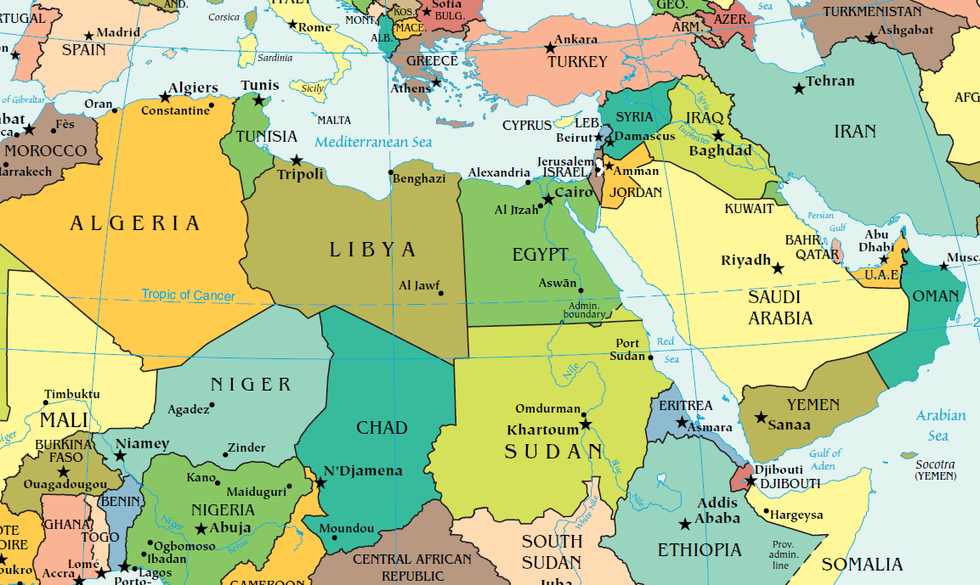Over Christmas break, I went to an Italian restaurant with my family where we were warmly and graciously greeted by the middle-aged and older host and owner of the restaurant. With Italian accents, bread baskets and wine all around, it seemed like a pretty authentic environment. But while we were eating the carpaccio appetizer, my parents overheard the two men speaking Arabic instead of Italian. Towards the end of dinner, my dad finally asked the older man where he was from. “Italy!” he responded in his thick accent. But after another question, he told us he had spent many years in Kuwait, in the middle east, and that the owner was actually from Tunisia in northern Africa.
A quick geography check shows just how close these countries you’d automatically assume to be quite different really are. Tunisia is just barely off the coast of Sicily, and Kuwait is the tiny country in green, less than 3,000 miles away, wedged between Saudi Arabia and Iraq.
Now this isn’t supposed to be an exposé on the Italian restaurant, but rather a lesson in culture because as my parents talked to the two men we know knew were not completely, or at all, Italian, the fascinating stories from their similar cultures came to light. Both of my parents are Indian, but my mom was raised in Kuwait and my dad lived in Abu Dhabi, UAE – the yellow country southeast of Kuwait – as well. All of the tales from a simpler time in now conflicted nations and the similar values came to light. As my brother and I were both born and raised in the United States, we’d only heard of such stories from our parents themselves. Stories and cultures this rich just can’t be made up, and are truly a blessing to be a part of.
It hasn’t always been easy, but being a part of an immigrant family and learning about my distant but ever-present culture has been instrumental in the process of becoming the adult I am today. Finding the Italian man with the Kuwaiti background and the Tunisian man not only showed me more about other cultures but also let me learn more about my own. Upon learning our Portuguese last name, one of them even brought out one of the chefs who knew Portuguese among six other languages. It’s so easy to be stuck in a cultural bubble when you’re not apparently in the most diverse environments, and it seems almost as common for people to be unwelcome towards diversity when it does appear. But this can’t be the way we go on, as a country, as a society, or as a global people.
As usual, this can all be summed up by the one of the most eloquent speakers and intelligent women our country has ever seen – FLOTUS Michelle Obama, in her final speech as First Lady:
“If you or your parents are immigrants, know that you are part of a proud American tradition — the infusion of new cultures, talents and ideas, generation after generation, that has made us the greatest country on earth. If your family doesn’t have much money, I want you to remember that in this country, plenty of folks, including me and my husband — we started out with very little. But with a lot of hard work and a good education, anything is possible — even becoming President. That’s what the American Dream is all about. If you are a person of faith, know that religious diversity is a great American tradition, too. In fact, that’s why people first came to this country — to worship freely. And whether you are Muslim, Christian, Jewish, Hindu, Sikh — these religions are teaching our young people about justice, and compassion, and honesty. So I want our young people to continue to learn and practice those values with pride. You see, our glorious diversity — our diversities of faiths and colors and creeds — that is not a threat to who we are, it makes us who we are.”
The everlasting words of the great poet Maya Angelou ring true with the same sentiment in her poem “The Human Family,” which is paraphrased in the Apple commercial from the 2016 Olympics, as well. This perspective is so important and one we should all be aware of.


















